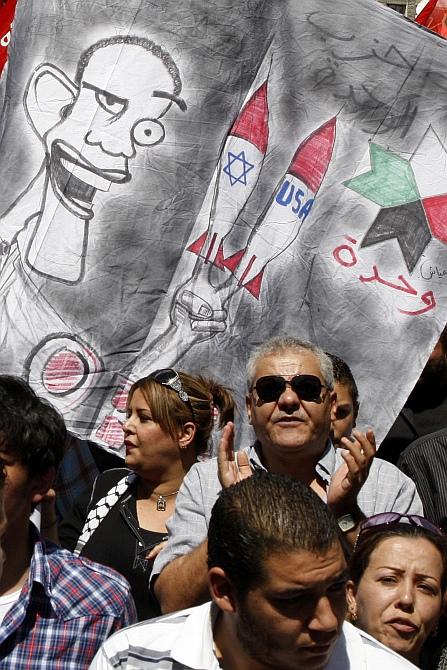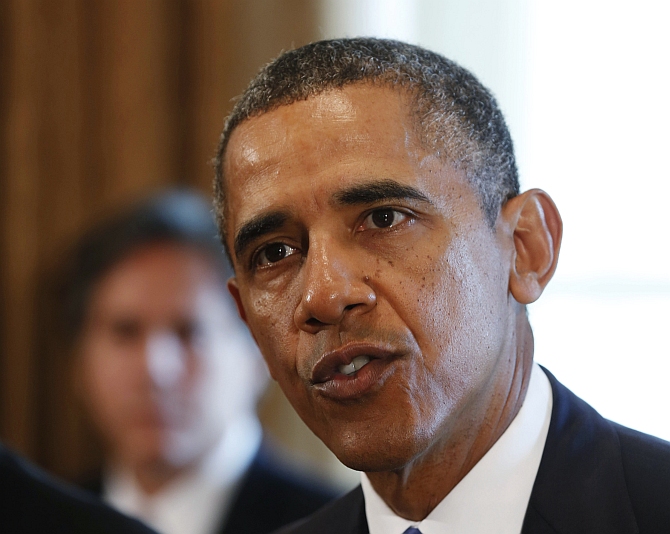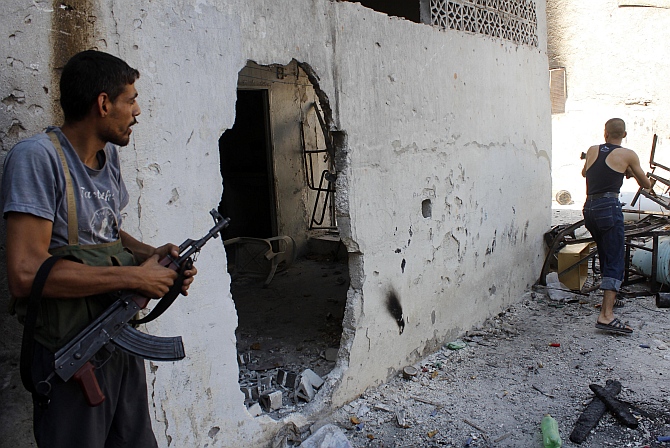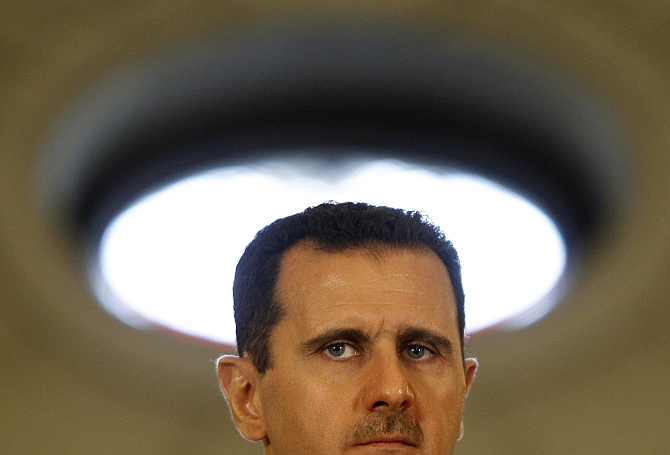 | « Back to article | Print this article |
Syria: US gears up for a dangerous intervention
An attack on the Assad regime is unlikely to bring relief to Syria’s oppressed and vulnerable population or end the civil war. It will spread the area of violence and increase the stream of refugees in a region wracked by conflict, violence and instability affecting the Gulf countries as much as West Asia, says Rajendra Abhyankar
Notwithstanding a thumbs-down for the British Parliament to Prime Minister David Cameroon the United States, with one or more of its NATO allies, appears poised to ‘punish’ the Bashar al-Assad regime for an alleged chemical attack on August 21 in the eastern suburbs of Damascus.
It appears as much motivated by the need save face, given President Barack Obama’s oft-repeated ‘red line’ dictum, as a pretext to get the Assad regime to restore the military balance on-the-ground between Western-backed rebel groups and the resurgent Syrian Arab Army.
The suggestion that a focused strike, to last no more than two to four days, is to hurt and not to overthrow Assad is too facile to stand muster. A parallel is drawn with the NATO attack on Slobodan Milosevic’s Serbian regime in 1994 and Operation Desert Fox in Iraq in 1998 knowing full well that those attacks neither had major strategic significance nor were able to avoid civilian casualties.
It suggest a high degree of risk-aversion in the Obama administration, and its NATO partners, to confront a post-Assad scenario of fractious, armed and radical rebel groups, like the Juhabat al Nasra, and its inevitable spill-over into Lebanon, Jordan and Israel in the melee.
Click NEXT to read further...
Syria: US gears up for a dangerous intervention
The cautionary statements by Russia and China to desist from a military attack and their opposition in the UN Security Council have not deterred the war-mongers. President Vladimir Putin’s latest exhortation, to produce conclusive evidence against the Assad regime before the international community, counters US Secretary of State John Kerry’s statement that the US just knows that the Syrian regime was responsible but cannot share data widely.
President Obama appears ready to go ahead either without a UNSC mandate or US Congress approvals required by the US Constitution or the mounting international opposition to this course of action.
It goes against both legality and norms of international behavior as presently practiced. The Syrian regime has not abdicated its sovereignty and still is in control of the country and its main institutions: the 3 million strong Baath party, the equally strong trade unions and the Syrian Arab Army.
With its obstinate refusal to give up during the last three years, unlike Saddam Hussein and Moammar Gaddafi, in the face of the onslaught by regional proxies, the regime is unlikely to buckle down.
Furthermore, despite the civil war’s spill-over effect and the occasional skirmishes on the Turkish or Israeli borders, it has not yet created a casus belli vis-à-vis Turkey, Jordan, Israel, Iraq, or Lebanon.
Click NEXT to read further...
Syria: US gears up for a dangerous intervention
There is no parallel with the Libyan situation before the UN Security Council mandated NATO aerial attack and even less with the trumped-up WMD inspired invasion of Iraq. Furthermore, the on-going civil war in Syria, is an internal conflict, does not justify armed attack by third states without UN Chapter VII action.
With Russian and Chinese opposition there is no prospect of this happening. Recent examples of NATO out-of-area operations have by-passed that body undermining the international system, flawed as it is, that exists.
The only justification that the US can resort to is that of humanitarian intervention or the ‘responsibility to protect’ by trying to put together again a ‘coalition of the willing’ based on the casualties and insecurity for the Syrian people, adverse regional security impact including refugee flows, weapons movements, and border instability and finally the need to enforce the Chemical Weapons Convention which Syria has not signed.
While this could be justified in some quarters, the strike will remain unlawful and create an unhealthy precedent for the future.
The ad-hoc nature of their proposed action is evident from the absence of clarity in objectives, course and outcome making the prospect exceedingly dangerous for the Syrian people, Syria’s existence as a state and the region as a whole.
At the same time, it is unlikely to deter the Assad regime from using chemical weapons again (if he did it earlier), could provoke an Iranian response through the Hezbollah against Israel and bring out in the open Israel’s support of rebel groups opposing the regime.
Such an attack will further exacerbate sectarian violence within Syria and create further insecurity for the Syrian people whom it is intended to succor.
Click NEXT to read further...
Syria: US gears up for a dangerous intervention
Syrian Foreign Minister Walid Muallem has vehemently denied that his government forces used chemical weapons stating that the area of incidence indicated is in the control of the SSA and there is no reason why they would attack their own people.
Experts have opined, corroborated by the Russians, that SSA’s success in its flushing out operations against the rebel groups around Damascus have led powers backing them like France, UK, Turkey, Saudi Arabia and Qatar to create the current situation.
President Assad has stated that after this premature orchestrated campaign without the benefit of the UN Inspectors report -- which will only pin-point the fact of the use of chemical weapons not the perpetrator -- we can expect that the conclusion will be doctored to suit Western compulsions aimed at removing him. The Syrians still continue to count on Russia and China in the Security Council and Iran on-the-ground.
The goal today is to end the mounting humanitarian catastrophe in Syria and the region by creating a momentum away from violence and sectarian strife and towards a political dialogue. The US-Russian initiative is still on the table.
An attack on the Assad regime is unlikely to bring relief to Syria’s oppressed and vulnerable population or end the civil war. It will spread the area of violence and increase the stream of refugees in a region wracked by conflict, violence and instability affecting the Gulf countries as much as West Asia.
India needs this time to join its voice to the chorus of world-wide opposition to the proposed US action. The question that General David Petraeus asked on the Afghanistan war remains unanswered in this case too: ‘Tell me how will this end?”
Rajendra Abhyankar is Chairman, Kunzru Centre for Defence Studies and Research, Pune and Visiting Professor, School of Public and Environmental Affairs, Indiana University, Bloomington
TOP photo features you missed last week
Click on MORE to see another PHOTO features...




